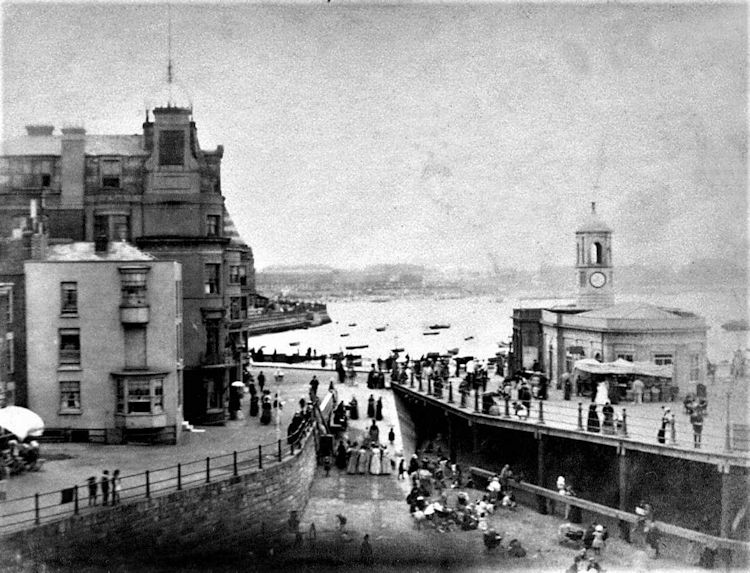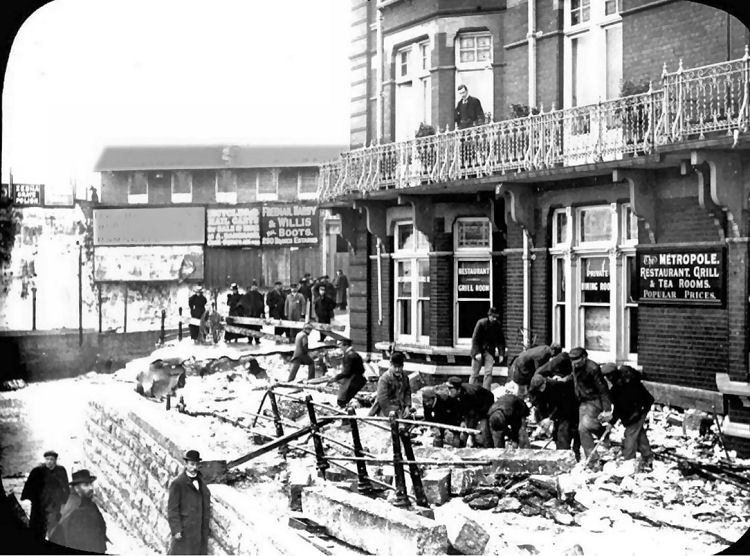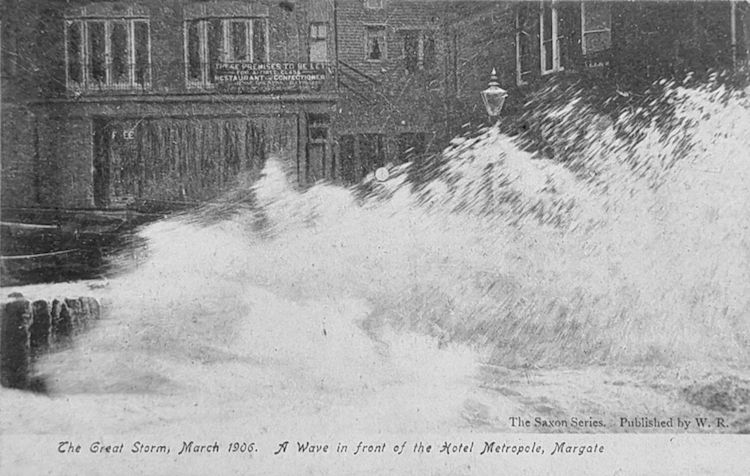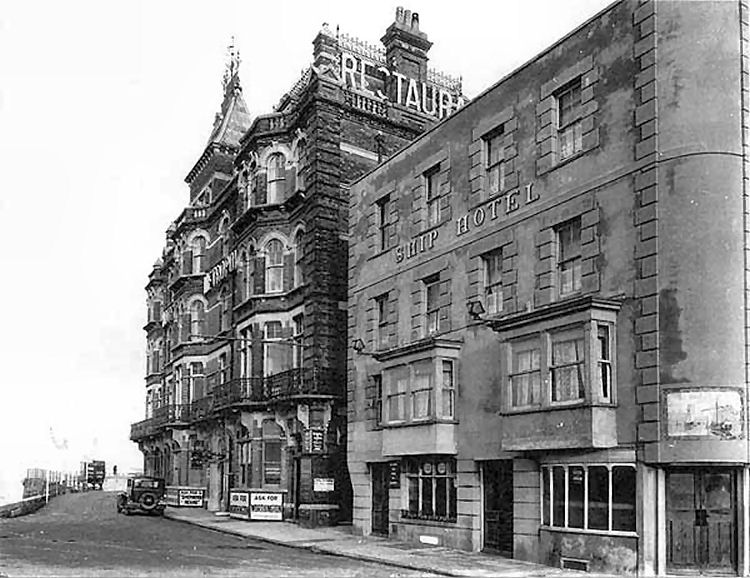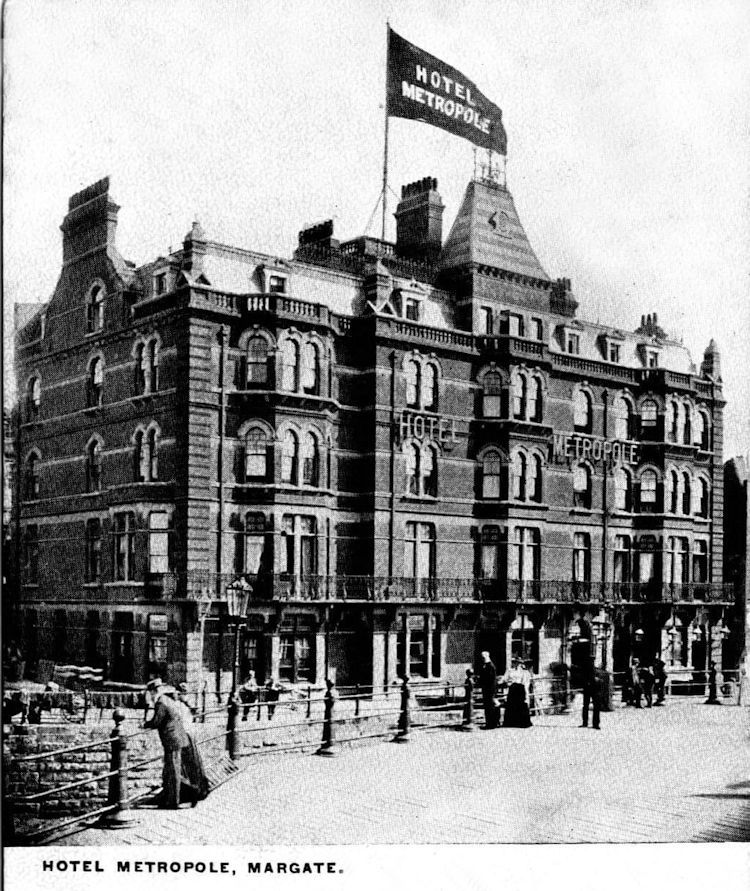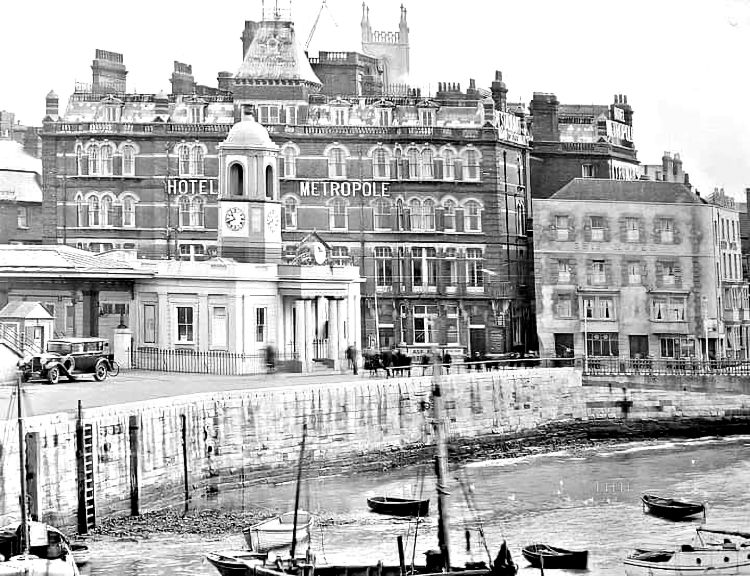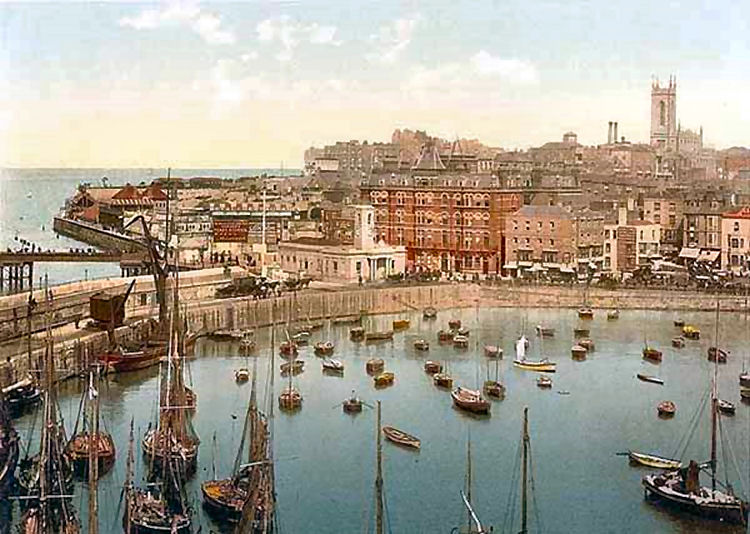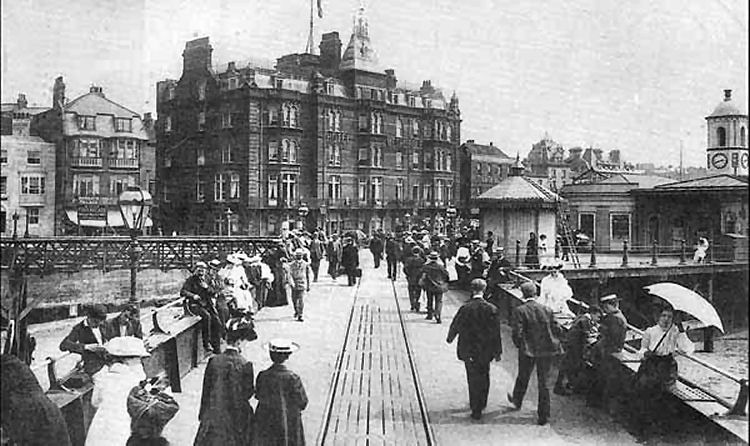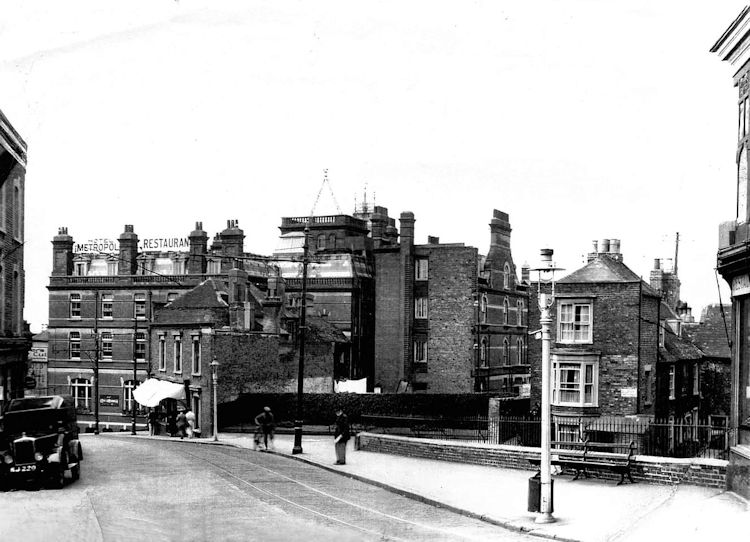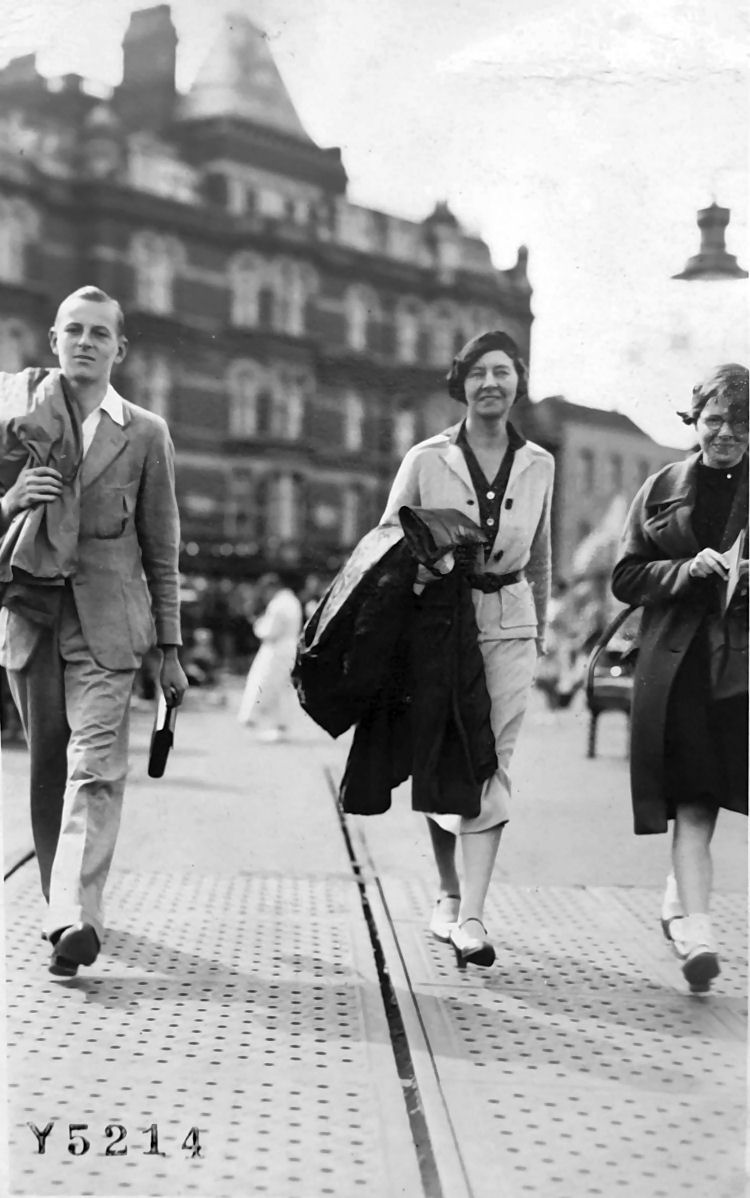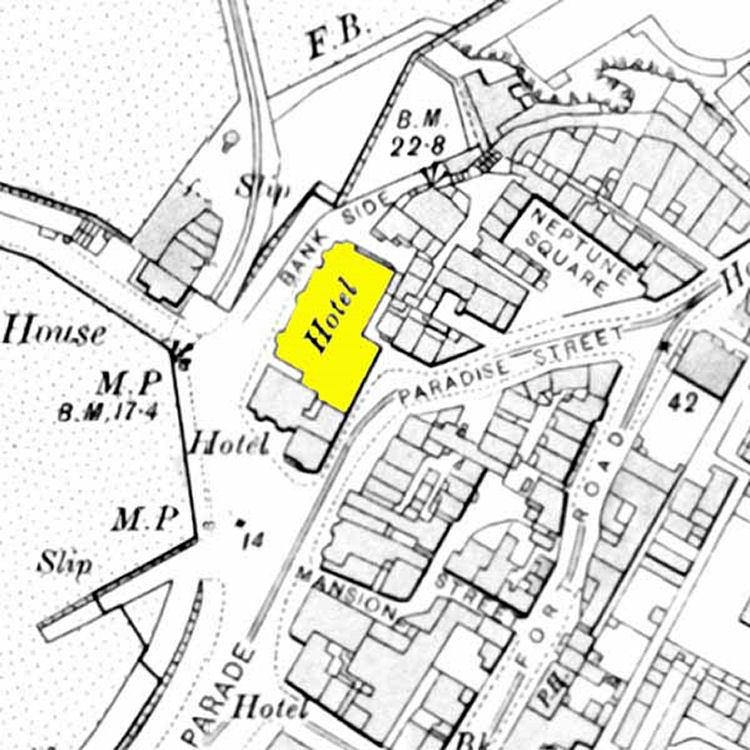|
Thanet Advertiser 31 March 1939.
END OF ROOM 66.
STORY OF MURDERED MOTHER.
MARGATE CRIME RECALLED.
Crash! As I stood and watched demolition workers hurtling barrow-loads
of brick and rubbish from the rapidly disappearing upper floors of the
"Hotel Metropole," Margate, years slipped by to the days when the
building was a centre of sordid interest.
But, I reflected, for a putty-sealed, air-tight coffin, an immaculately
attired, callous and hypocritical murderer might be continuing his
career of crime in far-off Australia, for the £3,000 insurance he
planned to gain by the murder of his aged and infirm mother would
probably have slipped through
his neer-do-well fingers long ago.
The mystery of Room 66, involving as it did, conduct unparalleled in the
history of British crime, was placarded by every national newspaper
early in the year 1930, and the central character, Sidney Harry
Fox—confirmed criminal in his youth—died on the scaffold shortly after
celebrating his 31st birthday. For years he lived as a parasite, and
before he murdered his mother he had unsuccessfully attempted to murder
a married woman who became his mistress, and whom he had induced to make
a will in his favour. Her property was valued at at about £10,000 and,
in addition, Fox had insured her life for £6,000.
Persuasive liar, elegant almost to the foppish, dark haired, handsome,
blue-eyed Sidney Harry Fox duped hundreds during his life.
The brutal crime which led to his undoing was committed in Room 66 at
the "Hotel Metropole" shortly before midnight on 23rd October, 1929.
Released from prison in March after a sentence of 15 months'
imprisonment for frauds and thefts, Fox took his aged mother Rosaline
from an institution at Portsmouth where she had lived during his
imprisonment.
A Modal Son.
Physically frail, the old lady was only able to walk with her son's
assistance, and in the light of after events it is apparent that Fox had
planned his diabolical act at that time. Mrs. Fox and her son had a
joint weekly income of 18s., of which 10s. represented the mother's old
age pension. Together they journeyed about the country and Fox, posing
as the perfect son, considerate of his mother to a degree, hoaxed
hoteliers and boarding house proprietors by the dozen. Among the roles
he adopted were those of doctor and estate owner.
Neatly dressed, Fox had only the clothing which he wore. Neither his
mother nor he had night attire, Mrs. Fox wore her two dresses one over
the other, and hoteliers were informed that their luggage had been sent
on. Fox was always expecting a large cheque, and under his glib tongue
people advanced substantial sums of money which were never repaid, and
he confidently signed cheques knowing they would not be met.
About three weeks after Fox was released from prison his mother signed
her will—drafted in her son's handwriting—bequeathing him all her
property. She then had two dresses, a handbag containing a comb,
handkerchief and a nail brush!
Daily Insurance Policies.
She signed the will on 21st April, 1929, and on 1st May Fox took out the
first daily accident insurance policy on his mother's life. From that
day until 23rd October—176 days later—when her lifeless body was carried
out of Room 66, he took out or renewed policies of a similar character
on no fewer than 167 days. Their joint income during that time was £22
10s. and Fox paid £10 of that money on his mother’s premiums.
At Ramsgate Fox obtained an accident insurance policy on his mother for
£1,000 and on 22nd October he obtained, at London, an extension of a
£2,000 policy, both policies being made operative until midnight on 23rd
October.
Twenty minutes before midnight. Fox, clad only in his shirt, rushed down
the hotel stairs, and attracted the attention of some commercial
travellers playing billiards with the fearful cry "I believe there is a
fire. Where is the Boots? My mummie, my mummie."
While Fox behaved like a distracted child, a commercial traveller
crawled into smoke and fume-filled Room 66 and carried out the body of
Mrs. Fox. Fox once interrupted his protestations of grief to ask if the
£25 in notes in his mother's handbag had been burned, and at the
inquest—the first conducted by Mr. S. J. Wilson Price, Margate's present
Coroner—related a string of lies, said he was educated at Framlingham
College and was of independent means.
Visions of £3,000 were enjoyed by the murderer for some time after a
verdict of death by misadventure had been returned, and so confident was
he that he obtained advances totalling £40 from the solicitor through
whom he made his insurance claims.
Exhumation Discovery.
Fox had no suspicion that an insurance officer with an inquisitive turn
of mind visited Margate, saw the fatal bedroom, and caused inquiries to
be made. Inspr. William Palmer, now Chief Constable of Margate, became
suspicious and increasingly curious when hotel managers came forward
with stories of Fox's duplicity. P.S. Fleet, now Inspr. Fleet, brought
the criminal from Norwich to answer a charge of false pretences at
Margate and during the subsequent inquiries in which Chief Inspr.
Hambrook and D.S. Ayto, of the C.I.D., were concerned with Inspr.
Palmer, the body of Mrs. Fox was exhumed at Great Fransham on 9th
November.
Because the undertakers made the coffin air-tight by sealing it with
putty the body was well preserved, and this putty in the coffin
eventually placed a hempen rope around the murderer’s neck. But for the
putty tell-tale bruises on the larynx and tongue would have disappeared
in the process of decomposition, and the skill of even so eminent a
pathologist as Sir Bernard Spilsbury would have been nullified.
Gradually an iron chain of evidence was welded against the criminal
showing that the debonair schemer strangled his mother with the aid of a
pillow while she was resting, and afterwards used petrol, a newspaper, a
chair and a carpet to stage a fake fire which gave off fumes apparently
contributing to asphyxiation, he had even gone so far with his plans to
mention, during the afternoon, that his mother and he had had a sham
fight—an extraordinary statement in view of his mothers age and
infirmity but the purport of which was understandable if his mother was
found bruised externally after the crime.
Faked Fire.
Expert witnesses, including Chief Officer Harry Hammond, who retired
from the leadership of the Margate Fire Brigade in December, proved
beyond doubt that the fire faked by Fox could not have been accidental,
and when sentenced to death at Lewes on 21st March, the blue-eyed
murderer—who never appeared to consider the possibility of
sentence—faced Mr. Justice Rowlatt and in a scarcely audible voice said
"I did not murder my mother. Amen."
Because of the notoriety which followed the murder, and the reluctance
of hotel guests to sleep in Room 66, the number of the room was changed.
Although he professed to be a woman hater, Fox infatuated an Australian
visitor at Southsea in 1927. He stood to gain more than £16,000 by her
death, after haring induced her to make a will in his favour, but his
plan went awry when his intended victim, awakened in the middle of the
night by the smell of gas managed to turn off the tap and thwart her
lover’s Plans.
Decree For Wife.
There was another sequel when Fox, sitting in a prison cell awaiting his
trial for the murder of his mother, was served with a divorce petition.
Named as co-respondent, Fox did not defend the action, and the
unfortunate woman who fell a victim to his unscrupulous wiles at Southsea
secured a decree the day before her husband was executed.
Birched as a youth for theft, Fox was an incorrigible rogue. He was an
associate of some of the most degenerate characters in the West End of
London, was fastidious to the extreme in his attire, and used, at times,
cosmetics. While employed at a bank he forged customers’ cheques and,
when detected, was not punished on condition that he joined the army. In
1916 he joined the Royal Ordnance Corps, later became a cadet in the
Royal Air Force, but never left the country.
Forging cheques, he lived a life of gaiety in the West End where, in the
uniform of a lieutenant, he continued his association with disreputable
undesirables.
Walter Hambrook, who was largely instrumental in bringing Fox before the
hangman 18 years later, was the young Scotland Yard officer who brought
about Fox's first swindling conviction. Trying to levy blackmail on Army
officers, forging cheques while employed at another bank, Fox could not
keep out of trouble, and several spells of imprisonment could not turn
the youth from his criminal career.
Room 66, scene of this inhuman act, will be no more within a few days.
But before the workmen begin to demolish the room several prominent
Margate townspeople, whose careers were largely influenced by the
historic case, will pay a farewell visit to the premises remembering the
callous scoundrel who paid the supreme penalty for his crime.
P.K.
|
